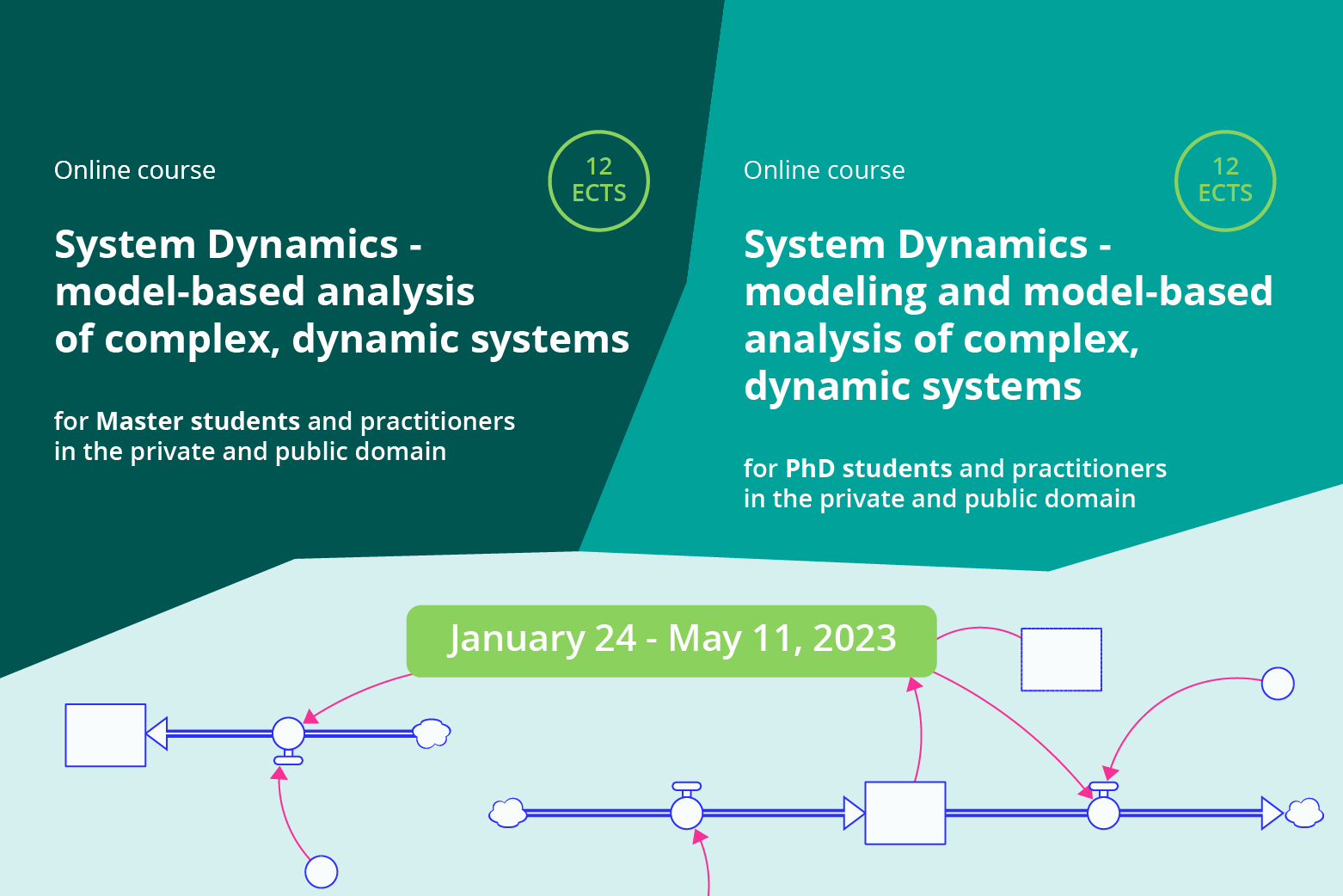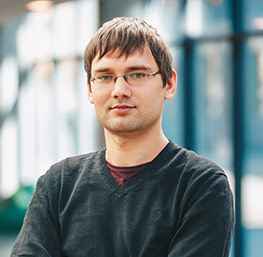System Dynamic course

RTU Online course | Master level
System Dynamics – Model-based analysis of complex, dynamic systems
RTU Online course | PhD level
System Dynamics – Modeling and model-based analysis of complex, dynamic systems
This course offers an introduction to System Dynamics modeling and model-based analysis of complex, dynamic systems. Its emphasis is on the relationship between system structure and dynamic behaviour, and on policy design. After an introduction to system dynamics, techniques and tools, the students are presented with three case studies and challenged to make use of system dynamics to recognize, identify, analyze and solve a vari¬ety of dynamic problems by means of modeling and simulation.
This course offers an introduction to System Dynamics modeling and model-based analysis of non-linear, dynamic systems. Its emphasis is on the relationship between system structure and dynamic behaviour, and on policy design and implementation. After an introduction to system dynamics, techniques and tools, the students are presented with five case studies and challenged to make use of system dynamics to recognize, identify, analyze and solve a variety of dynamic, non-linear feedback problems by means of modeling and simulation.
This course is intended for Ph D students (and advanced master students) as well as practitioners in the private and public domain, who;
- face the task of understanding complex, dynamic systems and may be challenged to manage such systems, – i.e. to develop strategies, design policies or undertake decision making in such a context.
- see the benefit of developing and making use of simulation models to understand and manage such non-linear feedback systems.
24th January 2023– 11th May 2023
on Tuesdays and Thursdays at 13.00-17.00 Riga Time (12.00-16.00 ECT Time)
12 ECTS
800 EUR
English
Stella Architect (will be provided during the course)
- John D. Sterman: Business Dynamics
- journal articles, and the content of presentations made available during the course
- Professor Emeritus at the University of Bergen, Norway
- Professor at Riga Technical University, Riga
- Co-founder of the European Masters Programme in SD
- More than 50 years of experience in the field of the system dynamics
- PhD, researcher and docent at the Riga Technical University, Riga
The fundamentals of System Dynamics & Modeling with Stella A. I
| Week 1 | The Fundamentals of System Dynamics & Modeling with Stella A. I & II
(History, Method, Complexity, Causal Loops) |
| Week 2 | The Fundamentals of System Dynamics & Modeling with Stella A. III & IV
(Stock & Flow, First order positive and negative loops, Feedback Loop Dominance) |
| Week 3 | The Fundamentals of System Dynamics & Modeling with Stella A. V & VI
(Delays, Arrays) |
| Week 4 & 5 | The Candide Case study
(Supply & Production Chain Dynamics (Oscillation), Aging Chains and Co-flows) |
| Week 6 & 7 | The Mr. Wang Case study
(Labor Supply Chain Dynamics, Oscillation Trends, Expectation Formation and Decision Making in Complex Domains, Shifting the Burden) |
| Week 8 & 9 | The Maibab Case study
(Predator Prey Dynamics Under Constraints, S-Shaped Growth from Shifts in Feedback Loop Dominance, Oscillations, Policy Robustness, Shifting the Burden) |
| Week 10 & 11 | Diffusion Dynamics
(S-Shaped Growth from shifts in feedback loop dominance, Epidemics and Word-of-Mouth) Causal Loop Diagramming |
| Week 12 & 13 | Equation formulation
Non-linear graph representation Story telling |
| Week 14 | Summary, data-import & export |
| Week 15 & 16 | The Project Case study
(Modeling, Reporting Orally and In-writing) |
Express knowledge and understanding
Students gain extended knowledge about the System Dynamics method with particular emphasis on model based problem identification and analysis. They also gain knowledge about the intimate relationship that exists between structure and behaviour (dynamics) in non-linear systems. They gain knowledge about robust strategy development, policy design and decision making (i.e. management). The students will know of the basic concepts of systems dynamics methods, techniques and tools.
Apply knowledge and understanding
Students will apply their knowledge in a series of comprehensive case studies, presented in class. They are challenged to investigate the dynamics arising from an underlying, non-linear structure by way of computer based modelling and simulation. Particular emphasis will be placed on their recognition of dynamic patterns of problem behaviour, as well as their ability to evaluate policies to address such problems
Make judgements
Students learn to make judgements about how well a model structure contributes to the explanation of an observed or hypothesised dynamic behaviour.
Communicate
Students are encouraged to participate actively in class and will be trained in writing presentations explain the relationship between structure and dynamic behaviour in complex systems.
Develop learning skills
The course is preparing the student for becoming a modeller, a problem identifier and a policy designer. It equips the student with the basic skills and tools to progress in the investigation of systems in ever more complex domains.
This course is intended for Ph D students (and advanced master students) as well as practitioners in the private and public domain, who;
- face the task of understanding complex, dynamic systems and may be challenged to manage such systems, – i.e. to develop strategies, design policies or undertake decision making in such a context.
- see the benefit of developing and making use of simulation models to understand and manage such non-linear feedback systems.
24th January 2023– 11th May 2023
on Tuesdays and Thursdays at 13.00-17.00 Riga Time (12.00-16.00 ECT Time)
12 ECTS
1560 EUR
English
Stella Architect (will be provided during the course)
- John D. Sterman: Business Dynamics
- Misc. journal articles, and the content of presentations made available during the course
- Professor Emeritus at the University of Bergen, Norway
- Professor at Riga Technical University, Riga
- Co-founder of the European Masters Programme in SD
- More than 50 years of experience in the field of the system dynamics
- PhD, researcher and docent at the Riga Technical University, Riga
The fundamentals of System Dynamics & Modeling with Stella A. I
| Week 1 | The Fundamentals of System Dynamics & Modeling with Stella A. I & II
(History, Method, Complexity, Causal Loops) |
| Week 2 | The Fundamentals of System Dynamics & Modeling with Stella A. III & IV
(Stock & Flow, First order positive and negative loops, Feedback Loop Dominance) |
| Week 3 | The Fundamentals of System Dynamics & Modeling with Stella A. V & VI
(Delays, Arrays) |
| Week 4 & 5 | The Candide Case study
(Supply & Production Chain Dynamics (Oscillation), Aging Chains and Co-flows) |
| Week 6 & 7 | The Mr. Wang Case study
(Labor Supply Chain Dynamics, Oscillation Trends, Expectation Formation, and Decision Making in Complex Domains, Shifting the Burden) |
| Week 8 & 9 | The Maibab Case study
(Predator Prey Dynamics Under Constraints, S-Shaped Growth from Shifts in Feedback Loop Dominance, Oscillations, Policy Robustness, Shifting the Burden) |
| Week 10 & 11 | The DOVID Case study
(Diffusion Dynamics (S-Shaped Growth from shifts in feedback loop dominance), Epidemics and Word-of-Mouth) |
| Week 12 & 13 | The Market Growth Case study
(Gain dynamics, Shifts in Feedback Loop Dominance, Shifting the Burden) |
| Week 14 | Summary, data-import & export, sensitivity analysis, optimization |
| Week 15 & 16 | The Project Case study
(Modeling, Reporting Orally and In-writing) |
Express knowledge and understanding
Students gain extended knowledge about the System Dynamics method with particular emphasis on model based problem identification and analysis as well as hypothesis formulation and analysis in policy design. They also gain knowledge about the intimate relationship that exists between structure and behaviour (dynamics) in non-linear systems and the shifts in causal loop governance that may take place in such systems. They gain knowledge about the significance of a robust strategy development, the associated policy design and the resulting decision making (i.e. management). The students will know of the basic concepts of systems dynamics theory, methods, techniques and tools.
Apply knowledge and understanding
Students will apply their knowledge in a series of comprehensive case studies that will be presented in class. Students are challenged to investigate the turbulent dynamics arising from an underlying, non-linear structure by way of computer based modelling and simulation. Particular emphasis will be placed on their recognition of dynamic patterns of problem behaviour and the corresponding underlying structures, as well as their ability to propose and evaluate policies to address such problems. Students are trained to distil the essence of their insights and present it in the form of compact causal loop diagrams.
Make judgements
Students learn to make judgements about how well a model structure contributes to the explanation of an observed or hypothesised dynamic behaviour.
Communicate
Students are encouraged to participate actively in class. The students will be trained both in writing and in oral presentations to explain the relationship between structure and dynamic behaviour in non-linear systems.
Develop learning skills
The course is putting the student on the track of becoming a skilled modeller, a problem identifier and a policy designer. It equips the student with the basic skills and tools to progress in the investigation of systems in ever more complex domains and familiarise the student with relevant scientific literature in the field.




